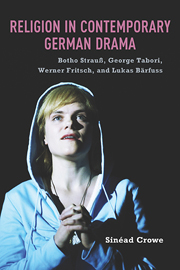 Religion in Contemporary German Drama
Religion in Contemporary German Drama Book contents
- Frontmatter
- Contents
- Acknowledgments
- Introduction: Definitions and Themes
- 1 The Relationship between Theater and Religion
- 2 Religion in Modern European Theater and Drama
- 3 “No One Wants to Get to God Anymore”? Botho Strauß's Groß und klein and Die eine und die andere
- 4 Theological Farce: George Tabori's Mein Kampf
- 5 “The Last Refuge for Metaphysics”: Werner Fritsch's Theater Theory
- 6 “The Feeling of Faith”: Fritsch's Wondreber Totentanz and Aller Seelen
- 7 Belief and Unbelief in the Twenty-First Century: Lukas Bärfuss's Der Bus (Das Zeug einer Heiligen)
- Conclusion
- Bibliography
- Index
1 - The Relationship between Theater and Religion
Published online by Cambridge University Press: 05 May 2013
- Frontmatter
- Contents
- Acknowledgments
- Introduction: Definitions and Themes
- 1 The Relationship between Theater and Religion
- 2 Religion in Modern European Theater and Drama
- 3 “No One Wants to Get to God Anymore”? Botho Strauß's Groß und klein and Die eine und die andere
- 4 Theological Farce: George Tabori's Mein Kampf
- 5 “The Last Refuge for Metaphysics”: Werner Fritsch's Theater Theory
- 6 “The Feeling of Faith”: Fritsch's Wondreber Totentanz and Aller Seelen
- 7 Belief and Unbelief in the Twenty-First Century: Lukas Bärfuss's Der Bus (Das Zeug einer Heiligen)
- Conclusion
- Bibliography
- Index
Summary
INSOFAR AS RELIGION AND THE ARTS BOTH ATTEMPT to interpret and give meaning to human existence, it could be argued that they have always been linked, and indeed that together they belong to the roots of culture. It is often claimed, however, that theater has an especially close bond with the ritual dimension of religion. This chapter aims to introduce briefly some important ideas about the nature of this bond. I begin by discussing the theory that ancient and medieval theater emerged out of cultic and Christian rites. I then turn to contemporary performance theory, which leaves aside the question of whether theater emerged out of ritual or vice versa and instead examines the performative connections between the two. While many modern theater-makers have been at pains to defend the idea that theater and religion are closely related, it should be remembered that there has been great antagonism between theater and religion at various points in Western history. Thus the chapter concludes with a brief overview of the Christian antitheatrical prejudice.
Theories of Ritual Origins
The theater historian Eli Rozik finds the earliest expression of the theory that there is a fundamental bond between theater and religion in the writings of nineteenth-century French author Charles Magnin. This view became more widespread toward the end of the nineteenth century, when some highly influential, if scientifically dubious, scholarship emerged contending that the earliest forms of theater originated in cultic rituals.
- Type
- Chapter
- Information
- Religion in Contemporary German DramaBotho Strauß, George Tabori, Werner Fritsch, and Lukas Bärfuss, pp. 15 - 22Publisher: Boydell & BrewerPrint publication year: 2013
